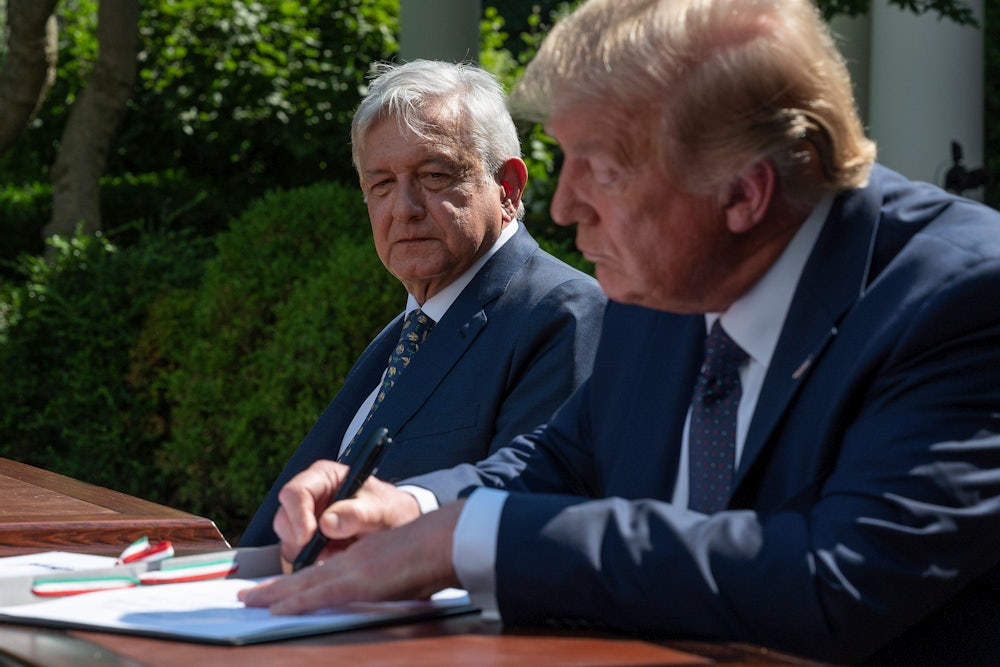There are a lot of hidden trip wires on the road to a greener economy. One of the biggest is the network of investor protections through which companies can sue states for enacting policies that render their investments—for example, their fossil fuel investments—worthless. And right now, the American Petroleum Institute is offering an object lesson in how that could work going forward, voicing its strong disapproval for Mexican energy policy and a not-so-thinly veiled threat.
Under the U.S.-Mexico-Canada Trade Agreement, or USMCA, drafted under the Trump administration to replace the prior North American Free Trade Agreement, controversial investor-state dispute settlement provisions were largely scrapped. Such rules, which have been criticized across the political spectrum in recent years, allow investors and corporations to bring suits against governments should their policies be seen as a threat to profits. Even Trump Trade Secretary Robert Lighthizer and the Koch brothers–founded CATO Institute have criticized such policies, citing the way they challenge national sovereignty.
But in the USMCA, which API enthusiastically backed, these investor protections were preserved for one important sector: oil and gas. As the trade publication Natural Gas Intel put it recently, the USMCA “enshrines the duty-free flow of electrons and molecules between the United States, Mexico and Canada.” Now, as Mexican President Andrés Manuel López Obrador tries to bring more of the country’s oil and gas industry under the auspices of state-owned oil and electricity companies, these investor protections are being used by American fuel companies to protect their interests.
The Texas company Finley Resources brought a $100 million claim against Mexico before the World Bank’s International Centre for Settlement of Investment Disputes last week, the first arbitration dispute brought by a U.S. oil services company under the USMCA. Finley alleges that the government didn’t honor a contract it entered into with Pemex, the country’s state-owned oil company. In a separate letter to U.S. officials earlier this month, the API argued that proposed changes to Mexican energy policy will “hinder new private investment in the energy sector as well as destroy the value of already operating private assets in violation of Mexico’s commitments” under the USMCA.
It’s important to note that this particular fight isn’t about emissions. The trigger here is López Obrador’s longtime interest in reviving Pemex. It is, however, a harbinger of what’s to come as more and more countries start implementing policies—particularly climate policies—that affect fossil fuels. Obscure trade laws that give foreign investors the right to dictate national energy policy are putting the planet at risk. Instead of just hectoring other countries to do more to reduce emissions, the Biden administration could use its outsize sway over global trade to change the rules that are protecting companies’ right to kill the planet.
A hallmark of U.S. climate diplomacy under Democrats has been to browbeat foreign governments into upping their climate commitments, while offering little beyond rhetorical commitments to binding climate action at home. The United States has a bully pulpit from which to go after the already embattled investor-state dispute settlement system and the threat it poses to a global energy transition, not just within the USMCA but in pressuring allies like the European Union to scrap controversial trade and investment deals that are undermining climate progress.
The highest number of cases brought before the international arbitration tribunal have been on energy-related issues, many of those under the Energy Charter Treaty. That agreement—signed in 1991 to assure investors that new ventures in the former Soviet Union wouldn’t be expropriated—entitles energy investors to sue governments for any policies they deem a threat to their profits, including urgent ones like coal phaseouts. Bizarrely, the ECT allows for investors to sue countries for 20 years after they pull out of the agreement, meaning that even if individual nations pull out, the system treaty could remain a powerful counterweight on climate action.
The majority of investor-state dispute settlement cases are brought against developing countries by investors in developed countries. Looking ahead, this system could not just slow efforts to transition off fossil fuels but also empower investors in everything from critical battery minerals like lithium and cobalt to green energy infrastructure like solar and wind to put profits ahead of the planet. Renewable energy now accounts for approximately 60 percent of suits under the ECT. (Many of those, the deal’s proponents like to point out, are battling anti-renewable statutes.) As the industry develops, it could also allow companies to sue over new regulations on the sector or competition from publicly owned firms. Advocates also fear these suits are being gamed by financial investors to extract cash from governments. Countries enacting strong labor standards for the technology metals needed to power electric vehicles, for instance, could come under threat, as could government procurement policies to buy more locally manufactured renewables and electric vehicles.
The U.S. is currently in fact hosting lawsuits under the Energy Charter Treaty, even those that don’t concern U.S. investors. Just this past week, a U.S. federal judge refused to dismiss a case brought by French and Luxembourgian investors in hydropower, concerned about their investments in Spain. In a truly absurd turn of events, Spain—whose social democratic government has passed a number of climate policies since coming to power in 2018—is now being asked to pay out $41 million for anti–clean energy policies enforced by a previous right-wing government. Eighty-five percent of the 47 suits brought over those measures have been filed by financial investors, not renewables companies themselves. This case, though it was brought under the ECT, was decided by an arbitration tribunal based in Washington, D.C. The investors turned to a U.S. federal court to enforce the award.
There’s nothing just or climate-friendly about these Byzantine rules. U.S. Trade Representative Katherine Tai has pledged to put climate at the center of her post. She has made a promising start toward rethinking this country’s famously regressive trade policies by supporting a waiver on intellectual property rights for Covid-19 vaccines at the World Trade Organization. But she also, this week, echoed API concerns about Mexican energy policy—a much less encouraging sign. Going forward, the administration has to decide whether to stand with oil and gas interests or the planet. If trade officials are more interested in the latter, they’ll have to risk pissing off fossil fuel lobbyists, as well as the many members of a financial system predicated on protection of return on investment above all else.








